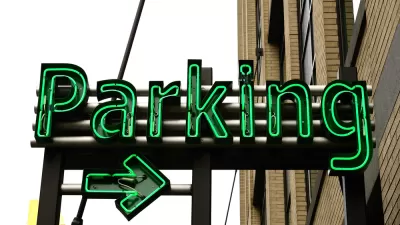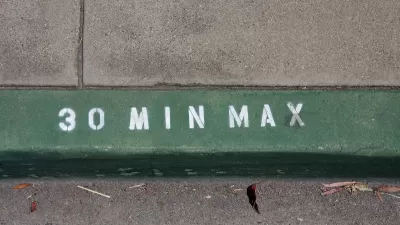"Something is wrong," proclaimed Los Angeles Assemblyman Mike Gatto (D), "when one in eight California drivers claims a disability." Gatto has introduced two bills: one to address disabled parking, the other could promote variable pricing of parking.
Credit: City of Santa Barbara
At a March 23 press event in downtown Los Angeles, "Assemblymember Mike Gatto (D-L.A., Glendale) outlined the magnitude of placard abuse issues, citing state statistics: of 24 million CA drivers, three million have some form of disability parking placard, whether a permanent or temporary placard, or a disabled person license plate," writes Joe Linton for Streetsblog California.
The disabled parking abuse manifests itself in ways that exceed the the number of motorists using the placards. It's the inordinate number of parking places that vehicles bearing disabled placards occupy, which can easily exceed one in eight spaces. In fact, it can reach an astounding 100 percent as the data below indicates.
Not only does this abuse reduce parking for all users, particularly those with true disabilities, but it weakens variable (also called dynamic) pricing used by newer, more advanced parking systems, and covered under Gatto's second bill.
AB 2602: "Disability Parking Placards," addresses the abuse at the state level that should assist cities tackle the huge scope of the problem. The bill would:
- "Streamline the processes by which the DMV takes back disability placards after the death of the disabled person.
- "Require re-application for disabled placards after a placard expires.
- "Removes state restrictions, allowing local jurisdictions (that meet certain criteria) to charge for and to enforce time restrictions on disability placard parking."
In his earlier Streetsblog LA editorial, Linton cites UCLA Professor Donald Shoup in a 2011 interview with Sreetsblog LA about "ExpressPark," LA's variable-priced parking system. It's tough to implement such a system when so many motorists are immune from it. Shoup states:
The main problem we already have in L.A. is the widespread abuse of handicapped placards. A disabled placard in California is like a “free parking” pass for the entire state. One of our students just finished his Masters thesis on placard abuse in downtown. He surveyed one block on Flower Street where there are 14 metered parking spaces. Most of the spaces were filled most of the time with cars that had disabled placards. For five hours of the day, all fourteen spaces were occupied by cars with disabled placards.
Although the meter rate was $4 an hour, the meters earned only 32¢ an hour in collections because most of the time the meters were occupied by cars that paid nothing.
For an in-depth academic review of the problem, see "Parking without Paying," Spring Issue, 2013 in University of California's Access Magazine, by Cornell University urban planning professor Michael Manville and Seattle transportation planner, Jonathan Williams.
Portland, Ore. tried a difference approach, effective July 2014, focusing only on the "free parking" aspect of the placard, as an earlier post indicates:
The new policy is simple: owners of disabled parking placards are treated like non-disabled motorists, i.e., pay to park, though they can park for a longer period. The one exception to the payment policy is for wheelchair users who are distinguished by a different type of placard. [See time chart and placard distinction on the Portland Bureau of Transportation website.]
"Gatto also stumped for AB 2586, the so-called “Parking Bill of Rights,” writes Linton, describing it as "somewhat mixed bag from a livability perspective." Among the six bullets he lists:
- Requires local governments to consider variable pricing when installing high-tech parking meters
Hat tip to Len Conly, Sierra Club's Bay Area Transportation Forum.
FULL STORY: Assemblymember Gatto Introduces Parking Reform Bills

Planetizen Federal Action Tracker
A weekly monitor of how Trump’s orders and actions are impacting planners and planning in America.

Maui's Vacation Rental Debate Turns Ugly
Verbal attacks, misinformation campaigns and fistfights plague a high-stakes debate to convert thousands of vacation rentals into long-term housing.

San Francisco Suspends Traffic Calming Amidst Record Deaths
Citing “a challenging fiscal landscape,” the city will cease the program on the heels of 42 traffic deaths, including 24 pedestrians.

Amtrak Rolls Out New Orleans to Alabama “Mardi Gras” Train
The new service will operate morning and evening departures between Mobile and New Orleans.

The Subversive Car-Free Guide to Trump's Great American Road Trip
Car-free ways to access Chicagoland’s best tourist attractions.

San Antonio and Austin are Fusing Into one Massive Megaregion
The region spanning the two central Texas cities is growing fast, posing challenges for local infrastructure and water supplies.
Urban Design for Planners 1: Software Tools
This six-course series explores essential urban design concepts using open source software and equips planners with the tools they need to participate fully in the urban design process.
Planning for Universal Design
Learn the tools for implementing Universal Design in planning regulations.
Heyer Gruel & Associates PA
JM Goldson LLC
Custer County Colorado
City of Camden Redevelopment Agency
City of Astoria
Transportation Research & Education Center (TREC) at Portland State University
Jefferson Parish Government
Camden Redevelopment Agency
City of Claremont





























